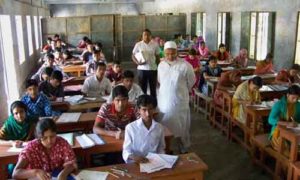Dhaka Times Report. 9 lakh examinees of the country are affected by load shedding. Government officials, however, said uninterrupted power supply during the test. But that's just talk now.

More than 9 lakh candidates had to complete their last minute preparations through hourly load shedding on the night before the examination on March 31. The students had to study in unbearable heat by lighting lamp posts and candles. Almost the same condition of load shedding prevailed in the sub-cities including the capital Dhaka. But the situation of load shedding in rural areas is more dire. Due to extreme load-shedding, the examinees have to face harassment. Parents of lakhs of students of the country are also worried about the availability of electricity in the examination hall today on April 1.
Those concerned said that currently there is a shortfall of about two thousand megawatts compared to the electricity demand. In addition, the demand for electricity has increased due to hot weather and heavy irrigation. All in all, there is an extreme shortage of electricity in the country. Since the present government came to power till the official inauguration of three 300 MW power plants in Chittagong on March 29, new power generation capacity has increased by 3 thousand 586 MW. Several other new centers are in trial production. Some electricity from there is also available in the national grid. Together, the power generation capacity in the country currently stands at eight thousand 305 megawatts. Some centers are always closed for maintenance. In some centres, especially the older ones, production is interrupted due to technical reasons. Therefore, the government excludes 20 percent of the total production capacity from the daily production calculation. Therefore, the production capacity is reduced to 6,640 MW.

Another source said that due to gas shortage, the production is reduced by about 600 MW. Due to mechanical problems at oil-fired plants and the government's energy conservation policy, production is reduced by at least another 400 MW. Finally, the confirmed production capacity stands at 5,640 MW. At present the average daily production is as follows. According to the government, the daily maximum demand for electricity is about seven and a half thousand megawatts. Of this, the government is now reducing the demand by 1,000 MW through Demand Side Management (DSM). Closing of shops in the evening, dividing the weekend of industrial and commercial activities of each area into separate days (Holiday Staggering), prohibiting operation of water pumps, ACs, electric irons etc. during evening peak demand and closing of industries from 6 pm to 6 am at the latest. DSM, etc. After DSM, the demand is about six and a half thousand megawatts. About 5,500 megawatts are being produced. Daily load shedding during peak demand is around 1000 MW. The situation is being dealt with by DSM of 1000 MW and load shedding of 1000 MW of 2000 MW shortfall compared to demand. Daily Yugantar, citing several sources related to the power sector, said that currently the daily load shedding is about two thousand megawatts.
Village people are suffering more due to load shedding as compared to different cities including the capital city. Because, there is no IPS or generator connection facility. Moreover, once the power goes out, there is no telling when it will come back. Apart from this, it is said that Eri irrigation activities are also being disrupted due to uninterrupted supply of electricity. As a result, the people of the village are worried due to the disruption of Irri irrigation on the one hand and the studies of the students on the other hand. Experts believe that if this situation continues, it will have a major impact on the production as well as on the country's economy.


